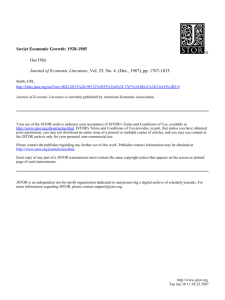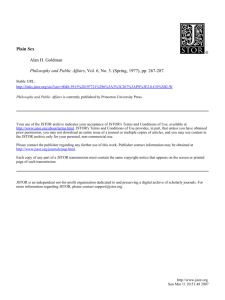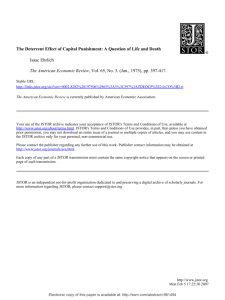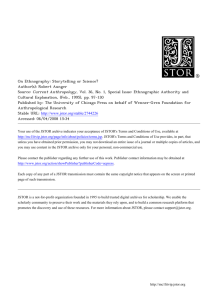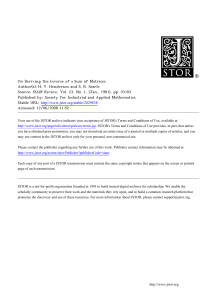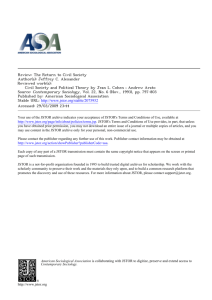Of Rule and Revenue. <contrib
advertisement
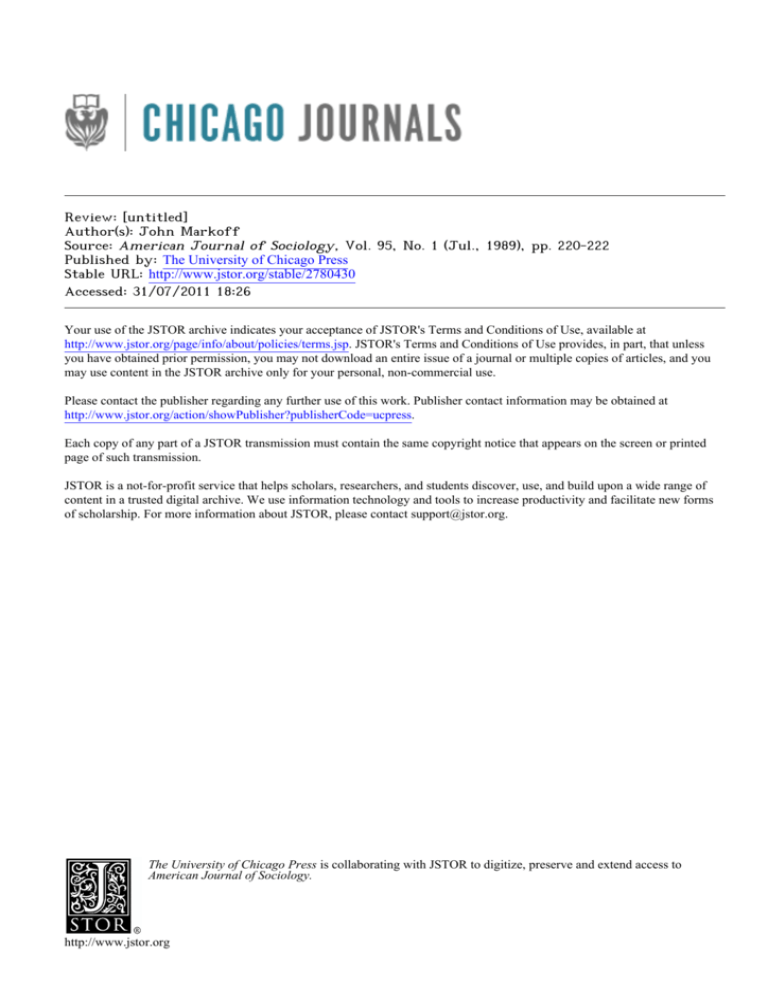
Review: [untitled] Author(s): John Markoff Source: American Journal of Sociology, Vol. 95, No. 1 (Jul., 1989), pp. 220-222 Published by: The University of Chicago Press Stable URL: http://www.jstor.org/stable/2780430 . Accessed: 31/07/2011 18:26 Your use of the JSTOR archive indicates your acceptance of JSTOR's Terms and Conditions of Use, available at . http://www.jstor.org/page/info/about/policies/terms.jsp. JSTOR's Terms and Conditions of Use provides, in part, that unless you have obtained prior permission, you may not download an entire issue of a journal or multiple copies of articles, and you may use content in the JSTOR archive only for your personal, non-commercial use. Please contact the publisher regarding any further use of this work. Publisher contact information may be obtained at . http://www.jstor.org/action/showPublisher?publisherCode=ucpress. . Each copy of any part of a JSTOR transmission must contain the same copyright notice that appears on the screen or printed page of such transmission. JSTOR is a not-for-profit service that helps scholars, researchers, and students discover, use, and build upon a wide range of content in a trusted digital archive. We use information technology and tools to increase productivity and facilitate new forms of scholarship. For more information about JSTOR, please contact support@jstor.org. The University of Chicago Press is collaborating with JSTOR to digitize, preserve and extend access to American Journal of Sociology. http://www.jstor.org AmericanJournalof Sociology systematic way since 1944by class oforiginand byelitepolicyat thetime of a cohort'sarrivalat adulthood. Ethnographicdetailfromthefieldstudiescomplements thetheoretical and empiricalwork. The authorsshow, forexample,how the "square house" serves as a symbolof success forthe agriculturalentrepreneurs. These houses become a tangiblesign of the possibilitiesof the second hierarchyin ruralHungary. For all ofitsvirtues,thebook is notwell organized.This is a pitysince it shouldhave manyreaders.The authorswould have been well advised to includean introductory chapterfornonspecialistson the structureof ruralsocietyin Hungary,bothpre-and post-1944.Althoughthestatistical analysesare elegantlydesigned,the discussionof the analysessometimesslips into an unappealing"techspeak"and at othertimesinto the eccentricity of a presentationof a sort of horse race among variables. Many of the tables could have been reservedforan appendix. But it is the excellenceof the book thatshouldbe emphasized.It is a measureofthebook's powerthatit notonlytellsus about socialistentrepreneursbut also providesan interesting on lookingglass forreflections theoriginsof agriculturalcapitalismin theWest and even on thecurrent class structures of Westernsocieites. It is worthmentioningthat Szelenyiconcludeswitha brief,thoughtprovokingreconsideration ofhis book withGeorgeKonradon intellectuals in socialistsocieties.Withtheriseofthesecondeconomy,intellectuals are, in Szelenyi'sview, apparentlynow stalled on theirroad to class power.Indeed, Szelenyilooksforwardnotto rulebyreforming intellectuals but to contentionbetweenthe leadersof the commandeconomyand leadersof the emergingmarketeconomy,withsome increasingfreedom and opportunity forthosewho can playone kindofmasteroffagainstthe other.And so a book thatbeginswiththe(qualified)celebrationofentrepreneurshipends with the discoveryof another venerable Western theme-the virtuesof plural centersof power. Of Rule and Revenue. By MargaretLevi. Berkeleyand Los Angeles: Universityof CaliforniaPress, 1988. Pp. x+253. $35.00. JohnMarkoff UniversityofPittsburgh Despite the frequencywith which social scientistsclaim to be studying "the state" these days, taxationremainsremarkablyunderstudied.The distribution of resourcesby governments in theformofwelfarehas been the subject of a greatdeal of research,the extractionof resourcesmuch less so. Yet taxationsystemsimpingeon many of the same issues: the developmentof governingstructures, class relations,conceptionsof citizenship, the interactionof governorsand governed.Gabriel Ardant's 220 Book Reviews kaleidoscopicworkhas stoodforsometimein splendidisolation.(Aretax codes drearierto read throughthan welfarestatutes?) In the past few years,thereare some indicationsof discoveryof this vitalbut unknownterritory, and MargaretLevi's OfRule and Revenueis partof thisnew interest.This studyhas a centralthesis,arguedthrough an examinationof case studiesas farremovedin timeas thetax farming oftheRoman Republicand theincometax of20th-century Australia,but it also presentsitselfmoregenerallyas an advertisement forthemodelsof rationalchoicetheauthorfavors.Levi asks us to considerrulerswho "are predatoryin thattheytryto extractas muchrevenueas theycan fromthe rulersmust deal with the population"(p. 3). Her revenue-maximizing costsof enforcing and monitoring compliance.The ruleruses agentswho may cheat or shirk.Taxpayers may be morewillingto pay if theyfeel they are contributingto a public good but are always leeryof being suckerswho bear the coststhatothersevade. Levi explorestaxationas a problemof collectiveaction.Taxation systems appear as continuouslyrenegotiateddeals betweenrulers,agents, and taxpayers.One criticalvariable is the relativebargainingpowerof actors:a feudal lord with a privatearmyand an impregnablecastle is hardto collectfrom.A secondis thecostofmeasurement. If theeconomy does not make much use of money,the centralbureaucracydoes not reachbelow county-sizeunits,and thepeasantscannotfillout forms(but can hide theirpigs),an incometax is notto be expected.A thirdelement is the ruler'stime orientation:those with long time horizonsfavortax practicesthatwill not kill the goose thatlays the goldenegg, but those underpressure(usuallythemilitary)tryto take what theycan gettoday. Perhaps the most inventiveconceptLevi deploysis "quasi-voluntary compliance."Some citizensmaybe willingto pay ("voluntarily") forwhat theysee as a serviceof the ruler,but only so long as all pay since the spectacleof freeridersmakes volunteersfeel like fools. To obtain the willingassentof some, then,the statecoercesothers. The case studies show that it is possible to employthis conceptual apparatus to reveal interestingthings about differencesamong and changeswithinsystemsof taxation.By virtueof its conceptualclarity, thisbook is likelyto influencethetermsofdiscourseoffutureresearch.I would like,therefore, to commenton someofthelimitsofthisdiscourse. Levi sees ideologicalcommitment as a motivationto complyor avoid. Lying"outsidethemodelof rationalchoice,"as she putsit, such a "nonrational,irrational,or imperfectly rational"(p. 50) elementis treatedas exogenousto her model. Ideational matters,however,seem part and parcel of her own centralconcepts. Free riders,for example, play a criticalrole in her analysis.But theidentification and even theexistence of freeridersmay be contestedterrain.Who is supposedto pay, what is regardedas a benefit,and whatis regardedas paymentare questionsthat may be differentially perceived,subject to conflicting judgments,and foughtover by propagandists.If noblesare exemptfrompayment,have 221 AmericanJournalof Sociology to war? If a churchdoes not theyfilledtheirpublicdutiesby contributing taxes,is thestatefailingin itsdutiesto compelpayment,or is pay property ofsociallife?Levi's itsdutiesto supportthereligiousgrounding it fulfilling stimulatingbook leaves such issues forsomeoneelse and takes as given such a sentimentas "all shouldpay": theproblemis that"all" and "pay" Levi showsthattheeconand redefinition. are subjectto social definition omist'stool kitneeds to be modifiedin thedirectionofgreaterrealismby politicalconsiderations.In thiscase it strikesme thatattenintroducing tionto politicalcultureis an essentialdirectionforstillgreaterrealism.I discussionoftheboundariesofhermodels hope thatLevi's worktriggers ratherthan merelyinspirestheprobablyinevitableapplicationsto other cases. The Social OriginsofPoliticalRegionalism:France,1849-1981. By Wilof CaliforniaPress, liam Brustein.Berkeleyand Los Angeles:University 1988. Pp. xiv+243. $28.00. JohnMarkoff UniversityofPittsburgh WilliamBrustein'sworkdeals withthe problemof regionalcontinuities in politicalallegiance,an importanttopicforhistoricalsociologyas well as a classic themeof Frenchhistory.Since his argumentin The Social Originsof Political Regionalismon the rootsof the distinctivepolitical colorationsof westernand MediterraneanFrance differsfromsome recent lines of argument,it should excitemuch interest.One of the most of westernconservatism, forexample,has it noteworthy interpretations thatdivided thattheconflictofthe 1790swas so intensethatcommunities thenhave remaineddivided;in short,muchofwesternFrancewas frozen into a traditionof supportingthe politicalRight.As forthe Mediterraaroundthemidarguedthatpoliticalconflicts nean south,it is currently dle of the 19th centurylocked many localitiesinto a sort of reflexive leftism. Brusteinis skepticalofexplanationsgroundedin regionalpoliticalcultures.He contendsthatpersistenceofvotingpatternscan be explainedby enduringconstellationsof materialintereststhat supportRightor Left allegiances. The varyingsocial structuresof the countrysideled cultivatorsin differentregions to understandtheir interestsdifferently. WesternFrance, with its highlevels of tenancy,dispersedsettlements, landholdisolationfromthetowns,and politicallyactiveclass ofwell-off ers, was a settingin whicha stratumof patronscontrolledthe resources vital to a dependentruralclientele.This clientelecould see thatitsinterests were bound up withthe local upper strataand voted forthe Right even when the secretballot freedthemfromelitecoercion.Contrasting modelsof thestructureof peasant interestexplainthepoliticalchoicesof otherregions. 222

